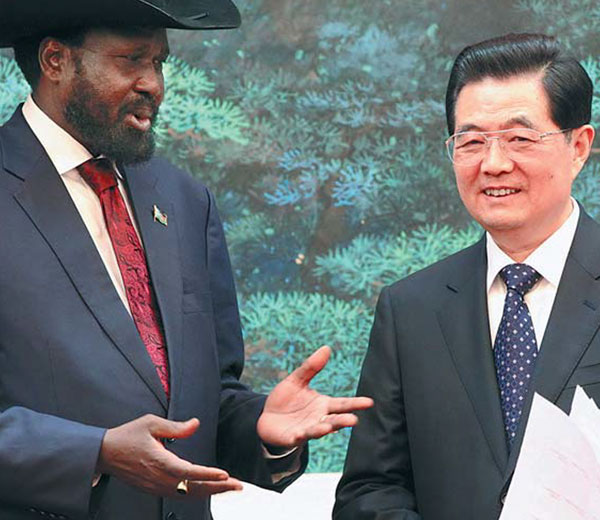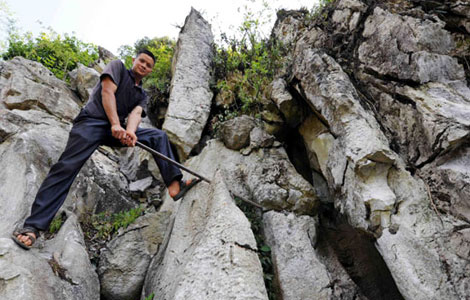 |
|
|
|
|||||||||
President Hu Jintao greets South Sudan President Salva Kiir Mayardit at the Great Hall of the People in Beijing on Tuesday. [Xu Jingxing / China Daily]

President meets South Sudan leader as dispute escalates
President Hu Jintao on Tuesday called for calm and restraint between Sudan and South Sudan during a meeting in Beijing with South Sudan President Salva Kiir Mayardit.
Beijing is unlikely to take sides between the two countries, Chinese experts said, but will try to broker a cease-fire.
Hu told Kiir that China wants the fighting to stop and disputes to be settled by negotiations, according to the Foreign Ministry.
“The priority at the moment is to act in concert with international mediation efforts and stop military conflict along the border area,’’ Hu said.
Kiir told Hu that his country wants to ease the tension and solve disputes through talks.
The two presidents also agreed to deepen cooperation in various areas, including energy and construction and both witnessed a signing ceremony for six agreements. Financing and humanitarian aid were among the agreements.
Kiir arrived in Beijing late on Monday. He opened his country’s embassy in the capital earlier on Tuesday and visited the headquarters of the China National Petroleum Company, which has invested heavily in South Sudan.
Sudan and South Sudan, which broke away and became independent last year, have been unable to resolve disputes over sharing oil revenue and border demarcation.
South Sudan got most of Sudan’s oil and provided some five percent of China’s oil until it shut down production in January due to simmering tensions.
Kiir is scheduled to meet Vice-Premier Li Keqiang and top legislator Wu Bangguo on Wednesday, and give a lecture at Peking University.
Kiir, on a six-day visit, will also go to Shanghai.
South Sudan’s military spokesman Col. Philip Aguer said Sudan continued with its aerial bombardment of South Sudan on Tuesday, dropping eight bombs.
Sudanese aircraft on Monday bombed a key bridge and a market in Bentiu, the capital of South Sudan’s oil-producing Unity State, residents and officials said. The attack killed at least two children.
The move dashed peace hopes after officials in Juba, the South Sudan capital, said on Sunday that it completed a withdrawal of its forces from the disputed oil town of Heglig. South Sudan invaded Heglig earlier this month, saying it belonged to the south.
Kamal Marouf, a Sudanese army commander, claimed in Heglig on Monday that more than 1,000 South Sudan troops were killed in clashes around Heglig.
Sudan’s President Omar Hassan al-Bashir fired up the political tension on Monday by ruling out future talks with Kiir, vowing to fight until all Southern troops or affiliated forces are chased out of Sudan.
UN Secretary-General Ban Ki-moon condemned the Sudanese bombings and called on the countries’ leaders to stop their “slide” to war.
China has repeatedly called for restraint and urged the two sides to return to negotiations.
“We hope both sides can make progress in their negotiations and reach agreement on solutions to resolve their disputes,” Foreign Ministry spokesman Liu Weimin said on Tuesday.
US President Barack Obama also condemned Sudan’s Monday bombing and said both countries “must have the courage’’ to return to the negotiating table.
African Union-mediated talks between the two countries recently broke down in Ethiopia. The African Union on Sunday called on Sudan and South Sudan to end “senseless fighting’’.
Li Xinfeng, an expert on African studies at the Chinese Academy of Social Sciences, said China is unlikely to take sides on the Sudan-South Sudan conflicts, as both countries are China’s “friends and partners’’.
But Beijing will use its influence to push for an end to fighting, he said.
Pang Zhongying, an international relations professor at Renmin University of China, said the tension has also put pressure on China, which has kept good relations with both sides.
“As a permanent member of the UN Security Council and a country that has been deeply involved, Beijing will work to achieve peace.”
Beijing is using “practical actions” to show its support for South Sudan’s development, Pang said.
“China invited Kiir to come to Beijing and signed six economic agreements. All of these indicate that China recognizes South Sudan and expects the country to become self-sufficient and self-reliant.”
Contact the writers at lixiaokun@chinadaily.com.cn and wangchenyan@chinadaily.com.cn
AP and AFP contributed to this story.

|

|

|

|

|

|